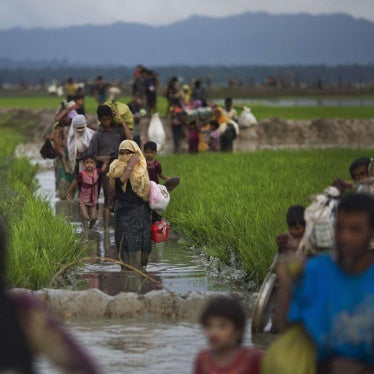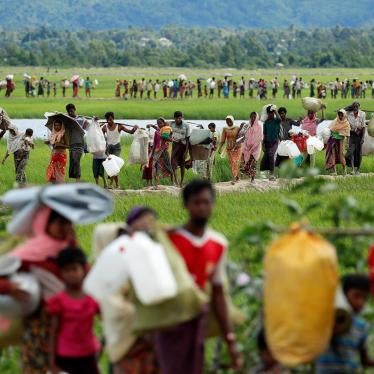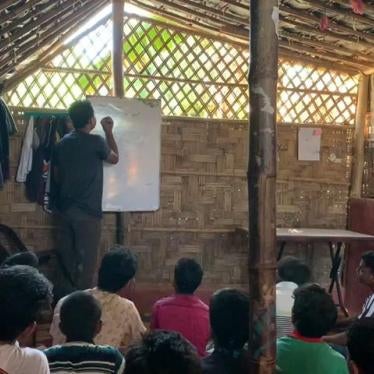Since August 25, 2017, when the Arakan Rohingya Salvation Army (ARSA), a militant group, attacked about 30 police outposts and a military camp in northern Rakhine State, Burmese security forces have carried out mass arson, killings, rape, and looting, destroying hundreds of villages and forcing more than 600,000 ethnic Rohingya Muslims to flee to neighboring Bangladesh. Thousands more Rohingya as well as ethnic Rakhine Buddhists and other non-Muslims have also been displaced in Rakhine State as a result of the violence.
There have also been numerous reports of abuses committed by ARSA militants. Human Rights Watch has not been able to independently verify those accounts, in part because of the lack of access to northern Rakhine State.
Human Rights Watch has called on the United Nations Security Council and concerned countries to adopt an arms embargo and targeted sanctions, including travel bans and asset freezes, against Burmese military commanders implicated in abuses.
The following questions and answers address issues related to justice and accountability for these abuses.
What international crimes have been committed in Burma?
The UN, various governments, and nongovernmental human rights organizations, including Human Rights Watch, have reported on serious abuses in northern Rakhine State against ethnic Rohingya. Human Rights Watch research, based on interviews with dozens of Rohingya refugees in Bangladesh and other accounts, and analysis of satellite imagery, have found that the abuses by Burmese security forces amount to crimes against humanity against the Rohingya.
Crimes against humanity are defined under international law as specified criminal acts “committed as part of a widespread or systematic attack directed against any civilian population, with knowledge of the attack.” Burmese military attacks on the Rohingya have been both widespread and systematic. Statements by Burmese military and government officials have indicated an intent to attack this population. The crimes against humanity reported include: 1) forced population transfers and deportation, including by burning Rohingya villages, 2) murder, 3) rape and other sexual violence, and 4) persecution as defined by various international tribunals.
Was Burma’s government previously accused of international crimes against the Rohingya?
The UN and others found that in 2012 local authorities and ethnic Rakhine with the backing of security forces committed numerous serious abuses against the Rohingya population. Human Rights Watch found that these abuses amounted to ethnic cleansing and crimes against humanity.
In October 2016, Burma’s security forces carried out large-scale attacks against the Rohingya in Rakhine State as part of “clearance operations” in response to ARSA attacks on three police border posts. Human Rights Watch documented extrajudicial killings, the rape of women and girls, and the burning of at least 1,500 structures.
The UN Office of the High Commissioner for Human Rights (OHCHR) documented many abuses in a “flash report” released on February 3, 2017, finding that these operations involved extrajudicial killing; enforced disappearance; torture and other ill-treatment, notably rape and other crimes of sexual violence; arbitrary arrests and detention; forced displacement; and destruction and looting of homes, food, and other property. The report concluded that the attacks against the Rohingya population in Rakhine State “very likely” amounted to crimes against humanity.
Can those responsible for abuses be brought to justice in Burma?
The Burmese security forces for decades have committed abuses with impunity, including extrajudicial killings, torture, sexual violence, arbitrary detention, and a range of war crimes in ethnic minority areas. The Burmese government has an obligation under international law to investigate and appropriately prosecute serious violations of international human rights and humanitarian law. However, under Burma’s constitution, the civilian government does not have authority over the military. Historically, courts in Burma have tried soldiers for human rights violations only infrequently and have never held soldiers to account for war crimes. Civilian courts have rarely had jurisdiction over soldiers implicated in criminal offenses. Further, the civilian government’s support both for the operations against the Rohingya and its discounting of alleged abuses make it extremely unlikely that civilian authorities will press for the credible investigation and prosecution of security personnel implicated in serious abuses.
Even before the most recent abuses, domestic investigations into alleged crimes committed by security forces in Rakhine State have lacked credibility, independence and rigor. Human Rights Watch and others have identified serious weaknesses with national inquiries led by Burma’s vice-president and the military, including poor investigation methodology, compromised leadership and bias by commissioners, a history of security force aversion to accountability, and a pattern of blanket denial of rights abuses.
The Kofi Annan-led Advisory Commission on Rakhine, which published its report in August 2017, had been asked by the Burmese government to look at root causes of conflict in Rakhine State. However, it did not have a mandate to investigate human rights abuses or address questions of justice and accountability.
In sum, any credible path to justice for those responsible for serious crimes will likely need to take place outside of Burma.
What steps has the UN taken to address abuses in Burma?
In March 2017, the UN Human Rights Council adopted a resolution creating a Fact-Finding Mission for Burma because of credible and serious allegations of human rights abuses in late 2016. The Fact-Finding Mission has the mandate to “establish the facts and circumstances of the alleged recent human rights violations by military and security forces, and abuses, in Myanmar […] with a view to ensuring full accountability for perpetrators and justice for victims, and requests the fact-finding mission to present to the Council.” While the Fact-Finding Mission will document violence and shed light on patterns of abuse, it does not have the mandate to investigate violations to a criminal standard, though its findings may help guide efforts to build case files that could later be used in prosecutions.
Can the International Criminal Court address these crimes?
The International Criminal Court (ICC) was created as a court of last resort to address grave crimes in violation of international law, such as crimes against humanity in Burma, where there is no possibility of national justice.
The ICC should have jurisdiction over the worst crimes committed in Burma. However, there are obstacles. The ICC has jurisdiction over crimes committed by states parties to its founding treaty, the Rome Statute, but Burma is not a member. Burma could submit itself to the ICC's jurisdiction, but the government's current posture makes such an event extremely unlikely.
UN member states may call on the Security Council to refer a situation to the ICC. But political dynamics in the Security Council – notably China’s and Russia’s likely objection to referring the situation in Burma to the court – make achieving an ICC referral challenging. In 2014, council members tried to refer the situation in Syria to the ICC, but Russia and China vetoed the initiative. China, in particular, has had close political and economic relations with successive Burmese governments. Similarly, a number of states have called for the council to consider an ICC referral for North Korea following the recommendation of a UN-mandated commission of inquiry, which found that the North Korean authorities were responsible for crimes against humanity over decades. However, so far there has been no resolution put forward, at least in part reflecting the council’s political dynamics.
Still, China and Russia have in the past been moved to support ICC referral efforts. The Security Council has referred two situations to the ICC: Darfur, Sudan, in 2005, and Libya in 2011. On Darfur, Russia and China abstained. On the Libya referral, both voted in favor. On a Burma referral, the Security Council will need to provide political and financial support to the ICC.
Are there parallel paths to justice?
Potentially, yes. Growing frustration among UN member states with the Security Council’s paralysis on justice has encouraged governments to become more creative in making justice a reality for victims of grave international crimes. This has led to two notable developments, which may be relevant for Burma.
In late 2016, the UN General Assembly created the “Syria Mechanism” “to collect, consolidate, preserve and analyze evidence” of grave human rights violations in Syria since March 2011 and prepare case files for eventual prosecution in national, regional, or international courts or tribunals that have jurisdiction to try these crimes.
On a similar track, in March 2017 the UN Human Rights Council strengthened the capacity of the Seoul field office of the UN High Commissioner for Human Rights – created by the Human Rights Council in 2014 to continue documentation of abuses in North Korea – to include “experts in legal accountability” to assess “all information and testimonies with a view to developing possible strategies to be used in any future accountability process.” These processes can help bring victims closer to justice in seemingly intractable situations and could offer a blueprint for other situations in which the path to justice through the Security Council remains blocked.
Unlike the commissions of inquiry for Syria and North Korea, these bodies can investigate violations to a criminal standard and prepare case files for eventual prosecution. The evidence gathered could be used to support eventual justice efforts, including before the ICC and in universal jurisdiction cases in other countries. More broadly, the information they analyze can contribute to developing a common understanding of both the criminal network and the key individuals involved in its operation. This makes it less likely that they will escape justice, including by contributing to a domestic political environment that is more favorable to seeing those responsible held to account.
Are prosecutions and trials possible in other countries?
Crimes against humanity are crimes of universal jurisdiction, meaning they may be prosecuted before national courts in countries outside of Burma, even though neither the victim nor the alleged perpetrator is a national of that country.
For instance, with respect to crimes committed in Syria, there has been a recent increase in universal jurisdiction cases in Europe. Sweden and Germany have been leading efforts to prosecute people suspected of committing war crimes in Syria. They have completed six such cases. Both countries have had an influx of refugees, which has made it easier for investigators to access witnesses, victims, and material evidence. In September, Sweden was the first country to prosecute and convict someone affiliated with the Syrian army.








